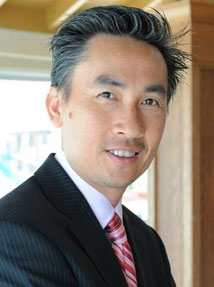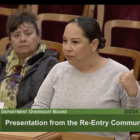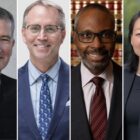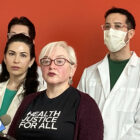Fifth and final interview is with Vu Trinh
One of the more important and most overlooked races in San Francisco is the campaign to be the city’s next district attorney. When Kamala Harris left the post for state office last year, outgoing Mayor Gavin Newsom appointed then-Police Chief George Gascon to take her place. Now, Gascon is running for a full four-year term, but faces stiff competition from four other candidates. Previously, we spoke with Bill Fazio, David Onek, Sharmin Bock and George Gascon. Today, in our final interview, we speak with Vu Trinh, a longtime public defender and current member of the Board of Legal Specialization.
Q: What is your primary message?
A: My primary message for the criminal justice system is to make it more accurate, to bring out the truth in a better way by using modern technology, making the system more effective and cost efficient and primarily fair and equal for all people.
Q: So you’re kind of an underdog in this race, why did you decide to get into it, since it’s such a crowded field?
A: Well there are many reasons why I decided to run for district attorney of San Francisco. Coming here to San Francisco, I was pretty shocked just in researching the state of law enforcement here in San Francisco. Regarding how they have basically de-policed the city in certain areas due to political motives.
Q: Explain what “de-police” means.
A: De-policing is a term where police may not add support to certain communities within their jurisdiction. So certain communities that we see that are impoverished, we look around even San Francisco, and look in the South or the Western Addition, where the projects are—they’re notorious for being high-crime neighborhoods and ridden with criminal street gangs and it’s primarily because there’s no real public safety there. And the police do not concentrate their efforts as much on these communities. When the de-policing issue came up was during the time of former Police Chief Heather Fong. The police maybe didn’t like that she was a woman and Chinese. So due to politics, they stopped policing. And that caused a spike in crime, especially homicides and robberies. I’ve seen that the city is way behind in technology as far as policing the city is concerned. Even way behind Oakland. Oakland is much more advanced in its police efforts.
Q: What would you do if elected district attorney?
A: The most effective tool to bring truth to light in the physical environment is the high definition video camera. If you walk around the city of San Francisco right now, every government building, including every police station, is protected by some type of surveillance system. Most agencies throughout the state have a video surveillance within their car, and now even, in Oakland they require the officers, as part of their equipment, to have a camera as well. And this is what I would encourage the people of San Francisco to utilize in conjunction with their law enforcement, and specifically here, I would say with the district attorneys office and not the police department. Mainly because the DA investigators who are trained in the law will have a better understanding of constitutional rights. I would implement a passive video surveillance program. Where anyone who wanted a camera to survey their property we would assist in identifying the proper tools to help them survey the public areas. This becomes a very good tool in deterring crime. That’s why the rich and the privileged, anywhere you go in the city, they’re utilizing this very effective tool. So I think the public in general, especially the people who are living and sleeping in fear every night, would welcome such a program.
Q: The district attorney’s office is considered very political. Why did the DA’s office get so political and how do you feel about that role for yourself?
A: I think the law enforcement role, especially local law enforcement role have been very political, especially in the United States, as the people travelled West, it was very lawless. And I think the people have a mandate that their law enforcement officers share the same values that they do. Which may not always be constitutional values that we should all share as United States citizens or residents. Because of these different conflicting values, the law enforcement organ of the criminal justice system, as well as the judicial organ has historically been very political. And I disagree with that because it often interferes with justice. San Francisco has always had a very political district attorney. In my own experience, my 22 years in the criminal justice system have been dedicated to the defense mission, I’ve seen that this politicization of the criminal justice system has done a very disservice to the entire justice system, where we see a lot of injustices when we see that prosecutors are more concerned with their conviction rate than doing justice and doing what’s right. And the police are also concerned with just arresting people to fulfill statistics. So that’s the main problem I see with the criminal justice system. From the law enforcement, to the district attorney being an elected official worrying about the constituency, worrying about the chief of police and the mayor’s office, than concentrating on enforcing laws. And one of my primary goals is to depoliticize that office from the DA’s office to the men and women who serve as prosecutors in that offices.
Q: So you hear a lot in San Francisco, even in the DA’s race here, which is kind of weird, you have DA’s fighting about who’s more liberal and who’s more of a reformer. I think that’s pretty uncommon in California. But there’s a lot of talk that the criminal justice system is broken. And I just wonder, are you, as someone who’s worked in the criminal justice system all of your professional career and who wants to be a prosecutor who sends people to prison, is that something you believe too?
A: Well it’s definitely broken and it’s broken in so many areas. Primarily law enforcement, the way we police, especially high-crime neighborhoods. We’re unable to identify perpetrators, especially since the eyewitness is a very bad witness. It’s been proven over and over again. Especially in a diverse community like San Francisco, where we have a lot of cross-cultural eyewitness identification. This could be the leading cause of innocent people being pulled into the criminal justice system. And then it’s broken in the area of adjudication because our judges are elected and they become very political and are unwilling to take the chance to rehabilitate someone. And then the legislature got involved in taking the discretion away from judges in certain areas where we have mandatory sentencing. So that’s why our prisons are filled up. This has become more detrimental to society than rehabilitation. So it’s definitely broken. And I consider myself, wanting to be a prosecutor right now, is to reform the system. I want to accurately identify people first. And then once we accurately identify then, we should always keep in mind that they have a right to due process. And that due process includes a right to defense counsel. And the criminal proceedings should be presided over by a wise and effective California judge that’s been trained in the law. Not by neighborhood judges. Because we have to protect the right of the accused.
Q: Give me your take on the campaign so far and your opponents and how the race is going.
A: I wish we would get more press coverage regarding this race because the district attorney in San Francisco primarily has been relegated to a very small role. Out of a seven billion dollar budget the district attorney has 39 million. And it would be impossible to fill the mandate to investigate and prosecute crimes with such a small budget. So I would force the city to put more money into the system, particularly the district attorney. The only problem I would have with the current district attorney and the criminal justice attorney—they call him the “professor”—is that they’ve never practiced criminal law. I believe that the area of criminal law is a very specialized area of law and if you’ve never practiced criminal law before, how can you be the district attorney and set plans and policy with the understanding of the goals of criminal justice? That’s my only main problem with them. The other two candidates, Ms. Bock and Mr. Fazio, from my understanding, have a lot of experience in criminal law. And I think because they are sort of clear old-school type prosecutors, their focus is more on adjudication instead of reform. And we really need a serious look at reforming the system.
This is a joint production between the San Francisco Public Press and KALW News.










